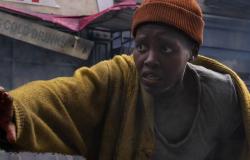
Hear
OMAHA BEACH, France.- They were ordinary people. Those young people who have come from far away They landed on the coast of Normandy on June 6, 1944. under a deluge of Nazi bullets from the cliffs they did not think of themselves as heroes.
“No,” says Gen. Darryl A. Williams, commanding general of U.S. Army Europe and Africa. “In that great battle, the allied soldiers were ordinary young men who rose to the challenge with courage and with a tremendous will to fight and win, for freedom.”
During the ceremony that took place this week in Deauville, on the coast of Normandy, in front of General Williams were 48 American survivors of that day, the youngest of them 98 years old, and the rest over 100. Many in wheelchairs, the veterans bowed with notable energy. Eight decades passed, and many of them in silence, because the memories of the war were unspeakable.
In 2034, when the 90th anniversary of D-Day is commemorated, perhaps there are no veterans left from that day. The living memory of his sacrifice on those beaches will have been lost.
“War clouds are gathering in Europe”Williams said in reference to the West’s determination to defend Ukraine from Russian aggression. This 80th anniversary of the landing is a celebration, but a somber one. Europe is worried and restless, and extremism corrodes the foundations of liberal democracies.
For more than 27 months, Europe has had an active war on the continent, which has claimed the lives of hundreds of thousands of young Russians and Ukrainians. Russia was not invited to these days’ commemorations, despite the Red Army’s crucial role in Hitler’s defeat. Just ten years ago, the president Vladimir Putin he was there. Today he talks about nuclear war. These are times of cracks and uncertainty.
Each of those long-standing veterans who returned to Normandy this week knows perfectly well what that situation can lead to, and how easy it is to sleepwalk into a war.
When disembarking, “the thing is between one and the one above”, says George K. Mullins, 99, former sergeant with the 327th Glider Infantry Regiment, 101st Airborne Brigade, recalling the day He crawled across Utah beach with a folding carbine clipped to his belt and two combat rations of three meals each. “You know that somewhere there is a higher spirit”.
D-Day was not the end but the beginning. The Normandy campaign, zigzagging in the sunlight through the insect-infested thickets that still divide the fields today, took a terrible toll.
Mullins, who now lives in Garberville, California, only peeked his head out of his trench a couple of days after the fighting began, and two trenches away he saw Private William H. Lemaster peeking over the edge of his trench: he turned out to be the last gesture of that young man from West Virginia.
A German sniper’s bullet passed through Lemaster’s head and killed him, a memory so vivid that this week Mullins He took a moment to kneel at his friend’s grave. in the American military cemetery in the French town of Colleville-sur-Mer.
In that cemetery there is 9388 graves, most of them in the form of white crosses, and a handful of them with stars of David, commemorating Jewish members of the American active service. To day what Anti-Semitism is growing again in Europein a sense those Stars of David seem to stand out more among the rest of the tombstones.
Here in Normandy, the thousands of people who died when the Allies assured their presence in Europe are present everywhere, like their black and white photographs that are stuck on wooden posts along the 1st (North American) Division Route that connects the town of Colleville-sur-Mer with Omaha Beach. Innocence and hope predominate in the youthful expression of those faces. The French philosopher Roland Barthes used to say that a catastrophe hides in every old photo…
Patrick Thomines, mayor of Colleville-sur-Mer, stops in front of a school adorned with the French, American and French flags. European Union (EU), symbol of the post-war transatlantic foundations of the West. “One understands that peace is never achieved forever, that ensuring it is an eternal struggle,” says Thomines. “We should unite to avoid war, but extremist parties are emerging that represent the complete opposite of what we celebrate here today.”.
The celebration has an extraordinary magnetism. The atrocious cratered landscape at Pointe du Hoc, reminiscent of the still pockmarked terrain of the tragic Battle of Verdun in World War I, forces us to ask ourselves again and again how the American Rangers managed to scale that cliff. Visitors flock to see it and continue to marvel.
Coming from countless countries, They assemble uniformed groups to recreate the experience. They travel in jeeps through the bushes, creating endless traffic jams. They party, dance and gather on the vast sandy beaches to solemnly contemplate how Europe got rid of Hitler.
Yuri Milavc, a Slovenian who came with 18 friends in several jeeps from Ljubljana, says he has already attended the D-Day commemorative events in Normandy several times, but adds that today he has mixed feelings. “I remember what Europe was like not long ago,” says Milavc. “Now Putin has taken off his mask and is waging an imperialist war in Europe”.
This week, the president Joe Biden will meet in Normandy with his Ukrainian counterpart, Volodymyr Zelensky, a show of allied support for Ukraine at a time of strong pressure from Russia on the battlefield. The French president, Emmanuel Macron, who invited Biden to Saturday’s state dinner, also decided to draw a strong link between the 80th anniversary of D-Day and the fight for freedom in Ukraine.
“With its bold and brave youth, our country is prepared and has the same spirit of sacrifice as our ancestorsZelensky said Wednesday in the French region of Brittany.
If we talk about spirit, it is difficult to match Wilbur Jack Myers, 100 years old, who was a corporal in Company B of the 692nd Tank Destroyer Battalion, assigned to the 104th and 42nd North American Infantry Divisions. Myers was so excited to return to Normandy for this anniversary that he says he feels “like he’s only 80.”. To prove it, he’s been enjoying karaoke sessions at his home in Hagerstown, Maryland.
Myers, one of 13 children in a Maryland family, was trained as a gunner and arrived in Cherbourg, France, on September 23, 1944. For him, it was the beginning of an odyssey which ended with the liberation of the Nazi extermination camp at Dachau, near Munich, at the end of April 1945.
“Those prisoners were skin and bones, and it was terrible to know that many more had already died,” says Myers. “I don’t forget them for a single day, but I was silent for 50 years because when I tried to talk about the war I would start crying and feel ashamed. Finally, I found the strength to speak.”
Sometimes Myers would go through the corpses of German soldiers and find crucifixes, and he would come to the conclusion that, despite their faith, they could not deny what Hitler said. Myers has a strong Christian faith and he says that makes him walk straight and love others, and thanks to that he survived to this day. He believes that hatred is part of human nature, and that the desire for money and power causes wars, but he also believes that faith can do anything.
And suddenly, he becomes reflective and brooding about the war. “I never killed anyone if it wasn’t necessary., although when we were immobilized I had no shortage of desire. That’s why Today I don’t understand why Putin is so willing to kill to take over other countries”.
With Europe once again at war on its own territory, the ghosts that the continent carries in its backpack rear their headswhen they seemed buried for two decades. The EU was created to end war and has proven to be a magnet for peace. NATO has been Europe’s military guarantor. Until now, these two institutions kept the situation at baybut today the line between the world and war seems thinner than it has in a long, long time.
The New York Times
Translation of Jaime Arrambide
The New York Times





